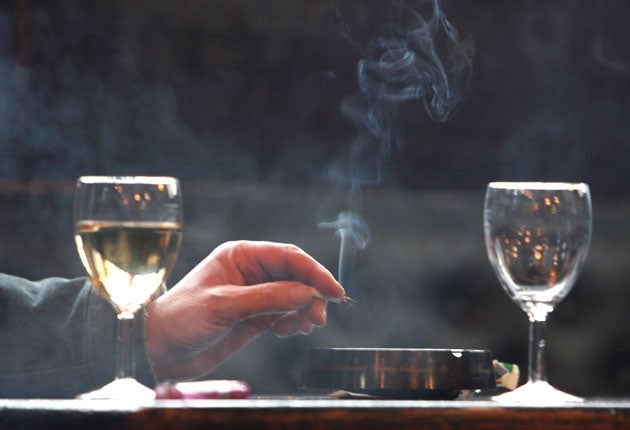Terence Blacker: Can drinking ever really be 'heroic'?
Distinctly dubious myths lie behind our admiration for celebrity boozers

As another of the great soaks of England makes his woozy way into the great beyond, we should brace ourselves for a round of that now-familiar game, Spot-the-Euphemism. Keith Floyd is being celebrated as "a character" with "an appetite for life". Someone will describe him as "one of the last great lunchers". Almost certainly we will discover that he "did not suffer fools gladly".
Some or all of these well-worn phrases were recently deployed, with suitable reverence, when Keith Waterhouse died. The Keiths shared more than a Christian name. They achieved great things in their lives and were loved by friends and the public, but their image was rendered rosier, larger than life, by booze. They were celebrated for what Richard Littlejohn characteristically described, in his tribute to Waterhouse, as "heroic drinking".
How we love those boozing heroes. Politicians and editorial writers are shocked to the core when teenagers binge-drink on a Saturday night, but a special fondness attends the celebrity who likes to get pissed – sorry, that should be "who leads a colourful life, more often than not with a glass in his hand."
Oliver Reed developed a useful sideline as a celebrity drunk, as did George Best and Richard Harris. In the last part of his life, Jeffrey Bernard built his journalistic career around being pie-eyed in a Soho pub and writing about it
Perhaps what we like about these men (drunk women are never quite as amusing) is that they represent a fake, fantasy life of laughter, warmth, companionship and self-indulgence. The world is divided into lunchers and non-lunchers, and most of us, because the idea of seeing the world through an alcoholic haze from the middle of the day onwards is unappealing, belong to the second category.
So the boozy lunch continues to be portrayed, at least in media circles, as a brave, generous if old-fashioned way to behave, usually by those who feel a weird sense of guilt for a way of living that suddenly seems bloodless, prim. The Keiths, it is implied, are not only enjoying life more with their heroic drinking but are adding significantly to the joy of others.
This sort of alcohol-envy pervades the obituaries of the great drinkers. The fact that Waterhouse could file his copy, however drunk or hungover he was, is presented as a titanic achievement. Floyd's on-camera slurping of red wine is said – wrongly – to have pioneered a new form of food programme.
Behind the admiration for celebrity boozers, there lie some distinctly dubious myths. One is that there is a connection between drinking and happiness – that boozers have led fuller, more fulfilled lives than they otherwise would have. A briefest glance through their obituaries and biographies will disprove that idea. Another even stranger suggestion is that heroic drinking actually helped these men in their careers. "Waterhouse inspired many to want to write, Floyd many to cook. Wine inspired them to do both," read one tribute this week.
Meanwhile, doctors are asking for drinks ads to be banned, and are widely supported by moralists in the press. When it comes to booze, we are in a muddled, befuddled state.

Join our commenting forum
Join thought-provoking conversations, follow other Independent readers and see their replies